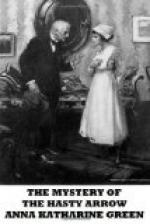“He says he was not given detective-duty—that he was placed there to keep watch over the body of the young girl;—that at a certain moment he imagined himself to hear a stealthy footstep approaching from the farther end of the gallery, and anxious to spot the man yielding to so doubtful a curiosity, he approached the arch separating his section from the adjoining one, and stopping just inside, stood for a moment or so, listening. As this involved the turning of his back upon the court and consequently upon the opposite gallery, it gave Travis just the opportunity he needed for an unobserved escape. But I see you are not very much impressed by the reason I have advanced for believing his story and placing him where he says he was placed, behind the eastern pedestal. You doubtless think that if the officer opposite had stood long enough with his back to the court, Travis might have taken those extra thirty steps as easily as the twenty he had confessed to. Listen, then, to my second reason, or rather, step this way.”
Leading his superior toward Room B, the door of which stood wide open, he paused just outside the threshold to note the effect produced upon the Inspector by what he saw inside. Evidently it was as marked with surprise as the detective had calculated upon, for with an air of great astonishment the Inspector turned upon him with the whispered exclamation:
“Travis here! where he could listen—see——”
“Yes. Take a good look at him, Inspector. It won’t trouble him any. I doubt if he would notice us if we stepped into the room.”
And such was the opinion of the Inspector himself, as he remarked the extreme excitement under which the Englishman was laboring. Absorbed in thoughts of his own, he was pacing the room with long strides, turning mechanically as he met some impediment, but otherwise oblivious to his surroundings, even to the point of not noting the presence of Sweetwater, who stood quietly watching him from one of the corners.
This display of feeling was certainly eloquent enough to attract anyone’s attention, but what gave it impressiveness to the official mind was this: his excitement was that of triumph, not fear, of hope without any trace of confusion.
“It is not of himself he is thinking,” muttered Gryce.
“And he stood here?”
“No—we left him free to move about at will, and his will carried him into full view of the whole performance.”
“And Sweetwater?”
“Was near enough to note his every move, but of course kept himself well out of sight.”
Then as they both stepped back from the doorway: “Mr. Travis didn’t know he was being watched. He thought himself alone; and having an expressive countenance,—very expressive for an Englishman,—it was easy enough for Sweetwater to read his thoughts.”
“And those thoughts?”
“Relief to find an explanation of the phenomenon he had doubtless been puzzling over for hours. The moments he had spent in hiding behind one pedestal had evidently failed to suggest that another man might have been in hiding behind the other.”




